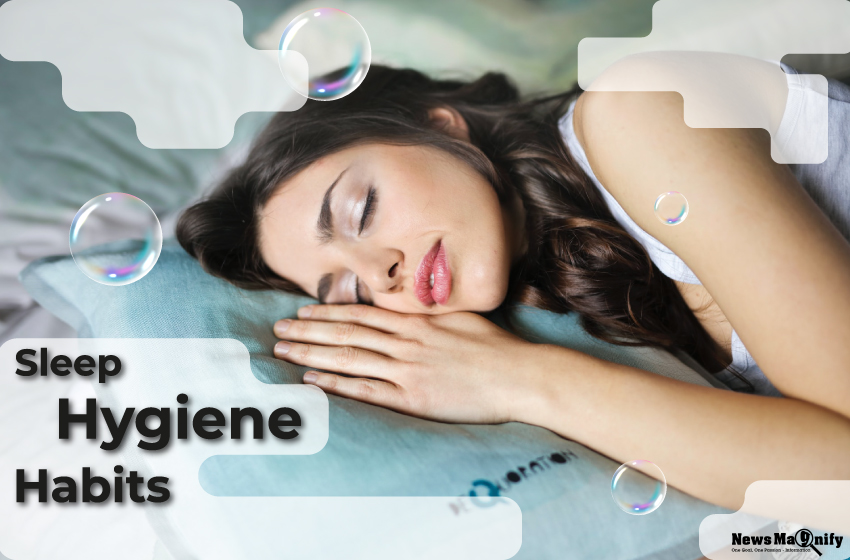
5 Most Effective Sleep Hygiene Habits You Should Start Now
- Lifestyle Health
 Prasoon Soni
Prasoon Soni- July 4, 2022
- 0
- 7 minutes read
Do you find yourself looking at the ceiling, thinking if you will ever fall asleep? Or maybe you wake up feeling it is time for you to get up and you see that it is 2 a.m. If you are in need of proper sleep, it may be time that you start to inculcate proper sleep hygiene habits.
What Is Sleep Hygiene?
Sleep hygiene implies healthy sleep hygiene habits. Proper sleep hygiene is crucial because receiving good sleep is for your physical and mental health along with your overall quality of life.
Your behaviors during the day, not just the moment you go to bed can impact how properly you sleep. Your drink and food choices, evening routine, schedule, and various other activities all have an important role in your ability to sleep. This is what is sleep hygiene in psychology implies.
5 Healthy Sleep Hygiene Habits
If you do not sleep well, you can take some steps, both at the time of the day and before you go to bed, to enhance your sleep. That is what sleep hygiene is all about: constructing several healthy habits to help you get a night of proper sleep for the night.
Let us take a closer look at 10 ways for 5 healthy sleep hygiene habits for better sleep.
1. Maintain A Consistent Sleep Schedule
Try to sleep and wake up at the same time regularly. This reinforces the sleep cycle of your body, which can make it more convenient for you to fall asleep and wake up each day. Sticking to a persistent schedule may also help decrease daytime sleepiness. Ensure that the bedtime you select enables you to receive 7 to 8 hours of sleep every night.
2. Form A Relaxing Bedtime Routine, And Stick With It
A soothing and relaxing bedtime routine allows you to unwind so you are ready to sleep. And keeping a prominent routine allows your body to identify that it is bedtime when you begin the routine. This may help you to fall asleep more quickly.
The ideal time to begin your routine is nearly 90 to 60 minutes prior to going to bed. Your routine can involve whatever makes you feel completely relaxed unless it includes a device that issues blue light. Here are some ideas that you can execute.
- Take a warm shower or bath. Not only is the water relaxing at that moment, but the decrease in your body temperature as you cool down afterward may make you feel sleepy.
- You can also try some gentle stretches that will help your muscles release and relax tension.
- Spend a few minutes and meditate to help calm your mind and body down.
- You can also try to listen to some soothing music while you focus on your breathing.
- You can also spend some time reading, but try to remain away from electronic reading devices.
3. Turn Off Your Electronic Devices Before Going To Sleep
Electronic devices such as your phone transmit blue light, which can decrease the melatonin levels in your body. Melatonin is basically a chemical that manages your sleep or wake cycle. When your melatonin levels fall, it can be harder to fall asleep.
Electronic items that emit blue light can also distract one’s mind, keeping your brain alert. This may make it more difficult to fall asleep. You might think that not surfing with your phone close to bedtime is sufficient, but keeping your phone near your bed can truly help you sleep, even if you are not aware of it.
The message notifications, light, and buzzing that can suddenly come up in the middle of the night can wake you up briefly, which may lead to a night of interrupted sleep. This is one of the most effective sleep hygiene for teens.
4. Exercise Regularly
As less as 30 minutes of cardio exercise, every day can enhance the quality of your sleep, along with your overall health. And if you can practice these exercises outside, that might raise the advantages even more, as exposure to natural light helps regulate the cycle of your sleep.
But if you cannot get outside, do not worry. Even regular indoor exercise may help you to sleep better. Just ignore exercising within an hour or two of your bedtime. This can raise your energy levels and also body temperature, which may make it more difficult to fall asleep. If you wish to do some type of activity later in the day, then you can try doing yoga or stretches.
5. Limit Your Intake Of Caffeine
The impacts of caffeine can last 3 to 7 hours after you intake it. This implies that your afternoon cup of coffee may effectively keep you awake and alert a lot longer than you would like.
Even though it is usually best to restrict your caffeine intake to the morning hours, remember that everyone has a varied tolerance to caffeine.
Some individuals may be able to stretch their consumption to midafternoon, while others might require to cut themselves off much faster in order to fall asleep conveniently. The less caffeine you intake, the more sensitive you may be to its impacts.
The Bottom Line
Sleep hygiene habits are nearly having a good habit of living. Your behavior both at the time of the day and around the bedtime can impact the quality of your sleep. If you have a difficult time staying asleep or falling, you can try various approaches to fall asleep quicker and remain sleeping for hours at a time. Most of these include enhancing your sleep hygiene.

